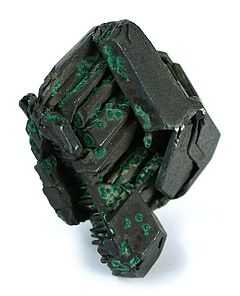Jalpaite
From Wikipedia, the free encyclopedia
| Jalpaite | |
|---|---|
 Jalpaite crystals from Jalpa, Municipio de Jalpa, Zacatecas, Mexico (size: 3.6 x 3.5 x 3.2 cm) | |
| General | |
| Category | Sulfide mineral |
| Formula (repeating unit) | Ag3CuS2 |
| Strunz classification | 02.BA.45 |
| Crystal symmetry |
Tetragonal ditetragonal dipyramidal H-M symbol: (4/m 2/m 2/m) Space group: I 41/amd |
| Unit cell | a = 8.67 Å, c = 11.75 Å; Z = 8 |
| Identification | |
| Color | Pale metallic gray |
| Crystal habit | Irregular and foliated masses, inclusions in other minerals |
| Crystal system | Tetragonal |
| Cleavage | Prismatic, good |
| Fracture | Subconchoidal |
| Tenacity | Sectile, malleable |
| Mohs scale hardness | 2 - 2.5 |
| Luster | Metallic |
| Streak | Black |
| Diaphaneity | Opaque |
| Specific gravity | 6.82–6.85 |
| Pleochroism | Distinct in oil, brownish gray to pure gray |
| Alters to | Tarnishes with iridescence |
| References | [1][2][3] |
Jalpaite is a rare copper silver sulfide mineral with formula Ag3CuS2.
It was first described in 1858 for an occurrence in the Leonora Mine, Jalpa, Zacatecas, Mexico and named for the locality.[2] It occurs in low temperature hydrothermal veins at temperatures less than 117 °C. Associated minerals include acanthite, mckinstryite, galena, sphalerite, pyrite, chalcopyrite, stromeyerite, polybasite, pearceite, tetrahedrite–tennantite and native silver.[1]
References
This article is issued from Wikipedia. The text is available under the Creative Commons Attribution/Share Alike; additional terms may apply for the media files.